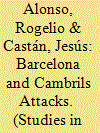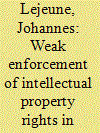|
|
|
Sort Order |
|
|
|
Items / Page
|
|
|
|
|
|
|
| Srl | Item |
| 1 |
ID:
191530


|
|
|
|
|
| Summary/Abstract |
This article analyses how counter terrorism policing before and after the August 2017 jihadi attacks in Catalonia was negatively affected by two factors: the Spanish policing model based on a decentralized security system and the independentist challenge posed by the Catalan Government. Firstly, the article assesses the political and legal framework vis-à-vis security in a quasi-federal democracy like Spain. Secondly, it analyzes how the police response to the jihadist threat was impacted by this multilayer system structured around a central government, seventeen autonomous regions, two autonomous cities, and over eight thousand local councils. Thirdly, the article examines how the challenge posed by independentists in the Autonomous region of Catalonia, who in 2017 attempted to break away from Spain in defiance of the Spanish Constitution, exacerbated the structural problems of the security system. It concludes that the combination of several factors in a particularly conflictive political environment led to the failure of counter terrorism policing on three levels: proactive, preventive, and reactive.
|
|
|
|
|
|
|
|
|
|
|
|
|
|
|
|
| 2 |
ID:
110893


|
|
|
|
|
| Publication |
2012.
|
| Summary/Abstract |
Sierra Leoneans have long seen their governance institutions as unresponsive and inefficient. Following the civil war, the government adopted a plan of fiscal, administrative, and political decentralization to mitigate widespread corruption, enhance accountability, and reverse the over-concentration of central authority in Freetown. The key institutions of decentralization, the chieftaincy system and local councils, play important but uneven decision-making, management, and implementation roles, making the process prone to elite capture. This article analyses the peacebuilding implications resulting from variation in strategies to counter elite capture in decentralization. It argues that the UN's variation of this approach, which focuses on relations between elites, has yielded few positive results. A second variation, employed mainly by international and national non-governmental organizations (NGOs), focuses on rebalancing asymmetries between elites and non-elites, and has been more effective in sensitizing non-elites to demand good governance and accountability. The challenges of redressing power imbalances between chiefdom actors and non-elites remain, and in addition to continued, robust oversight of local councils, the chieftaincy system requires deeper reforms to guard against further marginalization of non-elites and to achieve liberal peacebuilding goals.
|
|
|
|
|
|
|
|
|
|
|
|
|
|
|
|
| 3 |
ID:
131643


|
|
|
|
|
| Publication |
2014.
|
| Summary/Abstract |
The discrepancy between de jure and de facto protection of intellectual property rights in China remains a heatedly debated topic. Unfortunately, political motivations have distorted the debate from its very beginning, which has not only resulted in a tendency for the different explanations to be played off against each other, but has also reinforced their specific flaws and biases. This study addresses these problems by advancing and integrating the three main explanatory frameworks for explaining the situation. The resulting integrated framework finds that structural factors such as bureaucratic fragmentation and political decentralization matter most in practical terms, but their durability cannot be understood without putting them into context. The findings also suggest that, contrary to most predictions, the future development of intellectual property protection in China might not follow the path laid down by other countries that have modernized in the past.
|
|
|
|
|
|
|
|
|
|
|
|
|
|
|
|
|
|
|
|
|